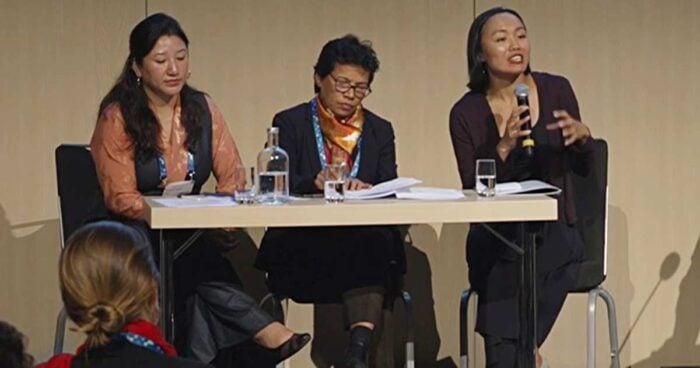
“Addressing Water Security Challenges in the Himalayan Region,” a panel on Aug. 24, 2023, took place at the World Water Week Conference in Stockholm.
A new white paper summarizing a panel at World Water Week 2023 in Stockholm is providing recommendations for China and other stakeholders to address water security in the region where Tibet is located.
“Addressing Water Security Challenges in the Himalayan Region” is available to read now.
The white paper is the result of the panel during World Water Week organized by the International Water Management Institute and supported by the US Department of State, the International Tibet Network, the Mountain Resiliency Project and the International Campaign for Tibet.
The panel featured two Tibetan experts based in exile: Tsechu Dolma, founder of the Mountain Resiliency Project, and Lobsang Yangtso, senior researcher at the International Tibet Network. The third panelist was Manohara Khadka, the Nepal country representative for the International Water Management Institute.
The thoughts and recommendations of all three panelists are featured in the white paper.
Water security panel
The panel took place Aug. 24, 2023 at the World Water Week Conference in Stockholm.
The discussion focused on environmental sustainability and climate change on the Earth’s “Third Pole,” as the Himalayan region is known.
That region is home to one-fifth of the world’s freshwater supply. Glacial runoff forms rivers in almost every country across South and Southeast Asia.
Under Secretary of State Uzra Zeya, who serves as the US Special Coordinator for Tibetan Issues, spoke to the panel by video message.
Asok Kumar, director general of the National Mission for Clean Ganga, Ministry of Jal Shakti, government of India, also addressed the panel by video, while Rebecca Peters, a water policy advisor to the State Department, delivered remarks in person.
“Water is essential to all life,” said Franz Matzner, director of government relations for the International Campaign for Tibet. “World Water Week brings together people from across the globe with a shared mission to use water for peace. ICT was proud to be a part of the event.”
White paper
The views of the three main experts at the panel—Tsechu Dolma, Lobsang Yangtso and Manohara Khadka—are featured in the white paper, which also includes a comment from Matzner.
The white paper touches on topics like adaptation measures in the face of climate change and receding glaciers; the implications of water challenges for women, poor and marginalized communities; and how global networks in water and environmental security can aid Himalayan nations.
The paper also includes Dolma’s, Yangtso’s and Khadka’s policy recommendations.
These recommendations call for:
- the People’s Republic of China and other central governments to halt policies that prioritize extraction
- building the capacity of local governments to design, implement and assess the impact of policies on equitable access to and control over water, land and energy
- the Chinese government to provide access to Tibet for independent media, scientists, NGOs, UN monitors and other international observers
- investing in sustainable renewable energy sources, such as solar or wind energy. Properly sited and constructed for co-management, such installations can generate clean energy while maintaining additional values, such as grazing and herding. The technology exists, so it is a matter of making choices
- and much more
Read the white paper, “Addressing Water Security Challenges in the Himalayan Region.”
Note: This document is prepared based on discussions and presentations at World Water Week in Stockholm. The views and opinions expressed in the document are those of the panelists and speakers and do not necessarily reflect the views or positions of any entities they represent and organizers of the session.

